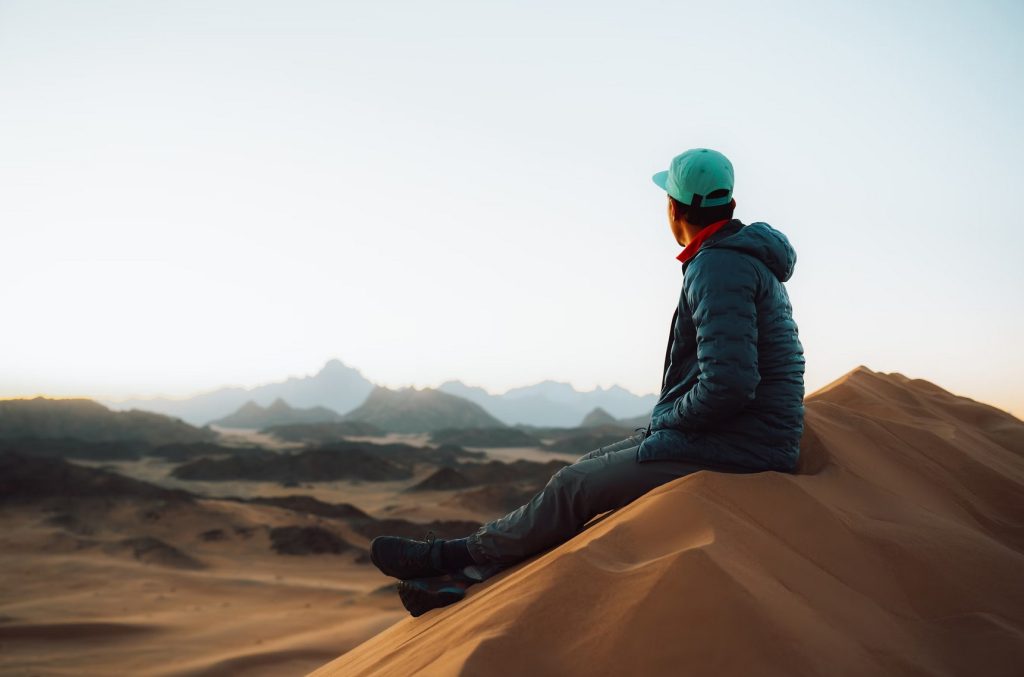Despite political events, the GCC’s tourism industry is defying expectations with most countries and Kingdoms experiencing a surge in tourism during the first half of this year. If you’ve missed the celebration, catch up here. While those tourists are coming from all parts of the world and with varied interests, there are two types of travellers the region loves who seem to reciprocate that love – the luxury traveller (as expected) and (somewhat surprisingly) the business traveller.
According to online business travel platform Tumodo, business travel to the Middle East is expected to grow up by 11.2% this year. So bring on the suits because financially, the increase in working visitors will aid the region in surpassing pre-Covid business travel expenditure to around $17 billion.
Meanwhile, Skyscanner reports that while 55% of travellers from the UAE are budgeting to spend more on travel this year compared to 2023, around 37% plan to upgrade their flight to business or first class.
Where luxury is concerned, the region is sparing no expense and pulling out all the stops to lure well-heeled travellers with next-level opulence. Saudi for example, has a multi-billion-dollar plan to transform the Kingdom into a luxury travel mecca, with projects like the glitzy Red Sea development, Neom’s Trojena and Magna rapidly taking shape and grabbing the attention of the upper echelons.
Now, to help travel providers capitalise on these two coveted markets in the GCC, we’ve broken down some of the key trends to note:
Business travel doesn’t mean business class

Indeed, not all companies can afford to fork out thousands for business and first class flights for their staff. In fact, most can’t.
According to Tumodo, around 88% of tickets purchased for business travel are in economy class followed by 10% in business and two percent in first class.
Interestingly, however, car rentals for business trips are up 17% this year compared to last year, indicating that companies would prefer their employees to make their own way around destinations rather than hire drivers and ride shares.
Sustainable sophistication
According to Consultancy Me, luxury travellers splurging want to know that their dollars are doing good for the world, and that sustainability has become a non-negotiable aspect of luxury branding.
Green practices are highly coveted amongst consumers and travellers, which is driving more businesses to become eco-inclined; and this is very much reflected in more and more businesses around the GCC. Dubai’s hospitality scene, for one, is ramping up their efforts with the Dubai Sustainable Tourism Stamp, a recognition program for hotels that meet the highest sustainability standards of adherence to DET’s ‘19 Sustainability Requirements’; while NEOM has just announced their super sleek electric hydrofoil fleet.
Business travellers are spending big
While companies may not be willing to book their staff in business and first class, they are still shelling out big bucks.
Business travel spending reached $933 billion globally in 2022, with the Middle East and Africa region accounting for $23 billion (around 2.5%). The global figure is expected to grow this year, with business travel spending anticipated to reach $17 billion.
Authenticity over superficiality for the elite

When it comes to travel experiences, it’s no longer about lavish products and amenities for the luxury seekers. They are also seeking genuine and profound connections that are meaningful and enriching, be it with the land, its people, culture or experiences. This can be achieved by crafting distinctive brand identities, and enhancing the customer experience with small touches such as storytelling and personalised engagement.
Business bookings at the fingertips
There’s been a major shift in the way business travellers are booking their trips, according to Tumodo, with more and more working travellers using their mobiles phones. Let’s face it, the convenience of the device and all of the intuitive apps is unbeatable at this stage.
The online business travel platform found that between 2022 and 2024, there was a 32% increase in mobile sales. So if you’re not already in the palm of the business traveller, you should be.
Tech-savvy sophisticates
This seems like a bit of a contradiction, but while luxury travellers seek and embrace authentic experiences, they are also expecting the latest technology to streamline their experience. Afterall, convenience is a hallmark of luxury.
According to Consultancy Me, the Middle East luxury market is at the forefront of adopting digital technologies to elevate the consumer journey, and their residents expect that same access to new and emerging technologies while on holidays. No doubt, the Middle Eastern market is setting a benchmark for innovation in retail and travel experiences.



